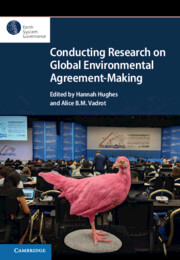Book contents
- Conducting Research on Global Environmental Agreement-Making
- Series page
- Conducting Research on Global Environmental Agreement-Making
- Copyright page
- Dedication
- Contents
- Figures, Tables and Boxes
- Contributors
- Preface
- Acknowledgements
- Abbreviations
- 1 Introduction
- Part I Developing a Methodology
- Part II Navigating Sites
- Part III Collecting and Analysing Data
- Part IV Implementing and Adapting
- Index
- References
1 - Introduction
A Broadened Understanding of Global Environmental Negotiations
Published online by Cambridge University Press: 07 August 2023
- Conducting Research on Global Environmental Agreement-Making
- Series page
- Conducting Research on Global Environmental Agreement-Making
- Copyright page
- Dedication
- Contents
- Figures, Tables and Boxes
- Contributors
- Preface
- Acknowledgements
- Abbreviations
- 1 Introduction
- Part I Developing a Methodology
- Part II Navigating Sites
- Part III Collecting and Analysing Data
- Part IV Implementing and Adapting
- Index
- References
Summary
The introduction explores why there is so much scholarly interest in global environmental negotiations and how the conceptualization and study of these has changed over time. It unpacks how to study global environmental negotiations and related sites as agreement-making defined as the multiple actors, sites, and processes through which environmental agreements are made, and the new sets and arrangements of actors, sites, and processes that are created by any specific agreement, which have the potential to reinforce or reorient the global political order. This approach is offered as a way to organize, spatialize, situate, and connect diverse forms of scholarship into, around, and related to negotiation sites and their products. The introduction provides an overview of the book chapters, which provide the methodological building blocks for conducting this research. As such, the book is relevant for many other nonenvironmental issue areas where collective action is at the core, such as global health, nuclear nonproliferation, security, and trade.
Keywords
- Type
- Chapter
- Information
- Publisher: Cambridge University PressPrint publication year: 2023
References
Further Reading
References
- 1
- Cited by

